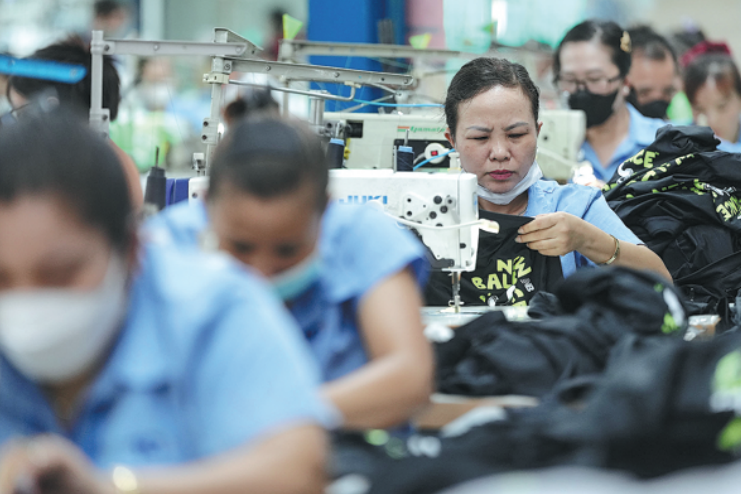China counters US tariffs
Rapid, intensive measures range from additional taxes to export controls

China fired off a sweeping package of robust countermeasures on Friday — including a 34 percent tariff hike and rare earth export controls — in response to the latest round of sweeping tariffs adopted by the administration of United States President Donald Trump.
More forceful and precise counterstrikes are still in Beijing's pocket if Washington persists with its unilateral trade bullying, several sources confirmed to China Daily.
As approved by the State Council, the country's Cabinet, China will impose an additional 34 percent tariff on all US-origin imports starting on April 10. Simultaneously, the Ministry of Commerce and the General Administration of Customs announced immediate export restrictions on seven key medium to heavy rare earth elements, as China Daily first reported on Thursday.
These elements — samarium, gadolinium, terbium, dysprosium, lutetium, scandium and yttrium — are crucial elements for manufacturing key products used in semiconductor, defense, aerospace and green energy.
Citing their dual-use nature in both military and civilian industries, a spokesman for the Commerce Ministry said: "Imposing export controls on them is a common international practice. As a responsible major country, China's decision to regulate these items reflects its consistent position of firmly safeguarding world peace and regional stability."
Other measures include filing a lawsuit with the World Trade Organization over the US' "reciprocal tariffs", launching an industry competitiveness investigation and an anti-dumping investigation regarding imported medical CT tubes from the US and India, adding 16 US entities to the export control list and 11 US companies to the unreliable entity list, and canceling import qualifications for certain US companies.
Tu Xinquan, dean of the China Institute for WTO Studies at the University of International Business and Economics in Beijing, said that such rapid, intensive and multi-pronged countermeasures are unprecedented in the world's history, proving that China will not sit back amid unilateral bullying tariffs.
"This isn't just tit-for-tat. These countermeasures, including both tariff and nontariff measures, aim to directly hit the weak spots of the US to make it feel the real pain," said Tu.
Bai Ming, a researcher at the Chinese Academy of International Trade and Economic Cooperation, said that China, as the world's second-largest economy, has taken the lead in resisting US trade protectionism.
"These countermeasures are not only to protect China's own interests, but also to safeguard the stable operation of the global trading system," he emphasized.
The State Administration for Market Regulation, China's top market regulator, also announced on Friday night that it has launched an investigation into DuPont China, a subsidiary of the US company DuPont, for suspected monopolistic practices in violation of China's Anti-Monopoly Law.
All of the moves came after China, a major trading partner of the US, was hit with a 34 percent so-called reciprocal tariff by the Trump administration on Wednesday, in addition to a 20 percent tariff imposed earlier this year.
Further counterstrikes could include tightening export controls on more critical raw materials vital for US high-tech manufacturing, new energy transformation and defense projects, and further escalating the blocking of key technologies used in extracting and processing strategic minerals, said two sources close to the matter, who asked for anonymity.
China accounts for at least 85 percent of rare earth refining, 77 percent of cobalt refining, 82 percent of tungsten production, 80 percent of antimony processing capacity, and 90 percent of the world's synthetic graphite production. These are all critical materials for defense, new energy batteries, semiconductors and advanced manufacturing.
Beyond nontariff measures, China could still adopt additional tariffs on certain US products, particularly agricultural goods. Having already imposed tariffs on key US farm products, China is weighing further increases, another source added.
Chen Wenling, former chief economist at the China Center for International Economic Exchanges, said, "China could follow the cases of countries like Canada and levy tariffs on US products in a high range of 250 percent to 390 percent according to different situations."
The latest tariff from the Trump administration is provoking a strong global reaction.
International Monetary Fund Managing Director Kristalina Georgieva warned that the sweeping tariffs presented "a significant risk to the global outlook at a time of sluggish growth".
Ngozi Okonjo-Iweala, director-general of the World Trade Organization, expressed deep concern on Thursday over the decline in global trade and the potential for an escalating tariff war sparked by US tariff measures. Iweala said in a statement that the US tariff measures will have "substantial implications for global trade and economic growth prospects".
Michael Hart, president of the American Chamber of Commerce in China, has said that AmCham China is not in favor of widespread tariffs, and it advocates constructive dialogue and policy predictability to reduce volatility in trade relations.
Quoting a report from the chamber that more than half of its member companies said they plan to increase investments in China this year, he said that ensuring that businesses can operate competitively and with greater certainty benefits both countries' economies and supports global economic stability.
Oliver Zipse, board chairman of BMW, said: "Economic growth thrives through opening, not closing. The increase of protectionist behavior will not create winners, but will result in a situation where everyone is going to lose prosperity. At BMW, we strongly oppose tariffs or other trade barriers."





































